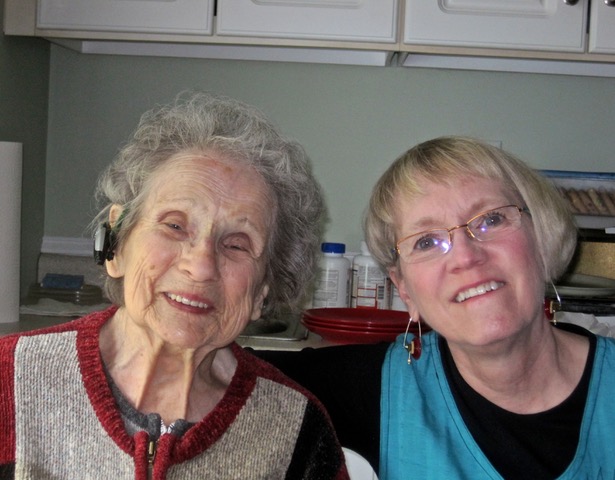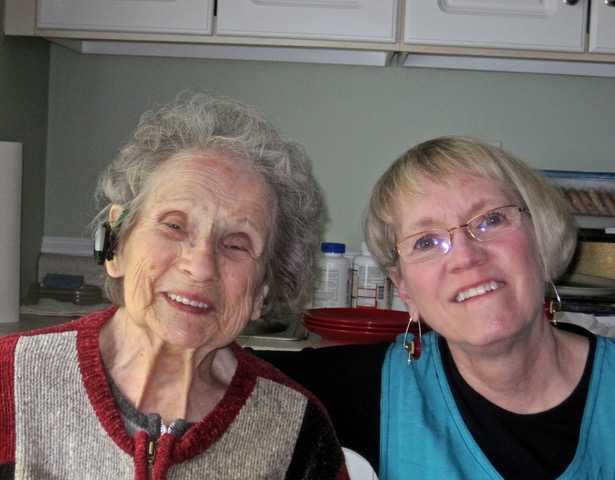
Claire Unsinn is a 67 year old family caregiver from Kennebunk, Maine. Claire talks frankly about the challenges that come with making the commitment to be there for a loved one, no matter what. She singles out the guilt that often comes with the choices caregivers have to make. And she notes something that caregivers often cite as being an unexpected by-product of care: the changes it forces on your existing familial relationships, in this case between her and her siblings.
Getting the added support for families stretched thin that the Homecare for All initiative on the Maine ballot this November 6th would provide, would help ease some of the family tension and her recurring guilt.

For my five siblings and me, providing care for our mother, and then our aunt, sometimes felt like moving through a revolving door that never stopped. One of us would take on the burden, burn out, and then then the next person would step up.
When my mother was 80 years old, she was diagnosed with Alzheimer’s. My five siblings and I met do discuss what to do, and we decided pretty easily that we would like to keep her in her own home for as long as possible. So my sister moved in with her, and when my sister was working, my aunt stayed with my mother.
After three years, my sister burned out, so I decided to take a leave of absence from my job and had my mom move in with me. My mother dreadfully missed her own home though, and she became quite depressed. Her Alzheimer’s symptoms developed further. Since my home was in Kennebunk and my aunt and my sisters lived in Springvale, they weren’t always able to travel the distance to come and give me a break, and I, too, became depressed.
Again, we all realized that my mom would be better off in her own home. So, it became my brother and his wife’s turn. They were retired, and so they left their home in Vermont and moved in with my mom to care for her. As her disease progressed, my mother eventually qualified for supportive services paid for by the state, and we were able to hire a woman who came in from 8 in the morning until 4 in the afternoon to help care for her. My sisters and I continued to pitch in on weekends and midweek evenings, and my aunt also helped out.
Caring for my mother definitely had its challenges. My sisters and I worked and still had children at home, so caring for our mother on top of that became too much at times. I never dreamed that someday I would be dressing, bathing, feeding, and toileting my mom. It was physically and emotionally demanding, but it was also rewarding to know that we were there to lovingly meet her every need as best we could.
I also didn’t imagine that it would create difficulties for us as siblings. We didn’t always agree on the best way to care for our mom. At times, our tempers flared and resentments grew.
When my mother lost the ability to walk, we placed her in a nursing home. Her disease had progressed to the point where she didn’t seem to notice her surroundings, and she died within four months of residency. In all, we cared for her for eight years.
After my mother died, my brother and his wife decided to stay in Maine. They had a home built that included an in-law apartment for my aunt, and she moved in with them when she was 92 years old. As her health declined, my siblings and I helped care for her in much the same way we had cared for my mom for a period of about a year and a half. Like my mom, we also had to place my aunt in a nursing home when she lost the ability to walk.
Unlike my mom, though, my aunt had a very sharp mind and was fully aware of her surroundings. She profoundly missed her home, and her physical and mental health acutely and rapidly declined. It was so painful to witness her misery. I still feel guilty about taking her from her home, but the cost of hiring a caretaker for 24 hours a day was prohibitive.
I sometimes think of the future and what life will be like for my husband and myself. I don’t want my children to be saddled with the burden of caring for us, but I also don’t want us to become nursing home residents. I strongly support high quality in-home care services, that pay workers well, to benefit my husband, myself, my siblings, and everyone struggling with care.
Follow the stories and experiences of Claire and others and join in the conversations about how we create community and break the isolation of caregivers on our Facebook page and on Twitter using the hashtags #WeKnowYouCare and #NationalCaregiversMonth.
November 1 — Leighann Gillis